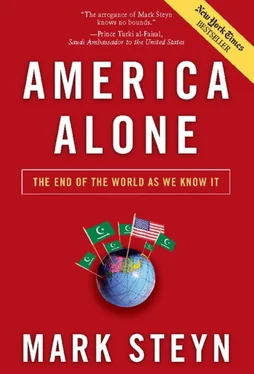Mr. Monderman’s thesis feels right to me — that by creating the illusion of security you relieve the citizen of the need to make his own judgments. Howard Zinn, in his introduction to Cindy Sheehan’s book Dear President Bush, pens this paean to the plucky underdog: “A box-cutter can bring down a tower. A poem can build up a movement. A pamphlet can spark a revolution.”
But the only reason “a box-cutter can bring down a tower” is because on September 11 our defenses against such a threat were exclusively the province of the state. If nineteen punks with box-cutters had tried to pull some stunt in the parking lot of a sports bar, they’d have been beaten to a pulp. The airline cabin, however, is the most advanced model of the modern social-democratic state, the sky-high version of the wildest dreams of big government; it’s Massachusetts in cloud-cuckoo land. So on September 11 on those first three flights the cabin crews followed all those Federal Aviation Administration guidelines from the seventies. By the time the fourth plane got into trouble, the passengers knew the government wasn’t up there with them. And, within ninety minutes of the first flight hitting the tower, the heroes of Flight 93 had figured out what was going on and came up with a way to stop it.
That’s been my basic rule of thumb since September 11: anything that shifts power from the individual judgment of free citizens to government is a bad thing, not just for the war on terror but for the national character in a more general sense. Charles Clarke, formerly Britain’s home secretary, gave a revealing glimpse into the big-government mentality in a column for the Times defending the latest allegedly necessary security measure: “10 cards will potentially make a difference to any area of everyday life where you already have to prove your identity — such as opening a bank account, going abroad on holiday, claiming a benefit, buying goods on credit and renting a video.”
“Renting a video”? That sounds about right. When you go to Blockbuster, you’ll need your national 10 card. But if you’re an Algerian terrorist cell coming in on the Eurostar from Paris to blow up Big Ben, you won’t. And its requirement for the routine transactions of daily life — “opening a bank account… buying goods on credit” — will have the same impact as all those street signs and traffic lights at that Danish intersection: it will relieve bank managers and store clerks of the need to use their own judgment in assessing the situation. You’d have to have an awful lot of faith in government to think that’s a good thing. Britain’s religious “hate crimes” law is another example of excessive street signage applied to the byways of society. It attempts to supplant human judgment with government management: the multicultural state is working out so well that we can no longer be trusted to regulate our own interactions with our neighbors. Islam, unlike Anglicanism, is an explicitly political project: sharia is a legal system, but, unlike English Common Law or the Napoleonic Code, for the purposes of public debate it will henceforth enjoy the special protection of Her Majesty’s Government. Given that the emerging Muslim lobby groups are already the McDonald’s coffee plaintiff of ethno-cultural grievance-mongers, you can be certain they’ll make full use of any new law. Political debate in Europe is already hedged in by excessive squeamishness: Holland’s “immigration problem” is a Muslim problem, France’s “youth problem” is a Muslim problem, the “terrorism threat” that necessitates those British ID cards is in reality an Islamic threat. How is preventing honest discussion of the issue going to make citizens any safer? The term “nanny state” hardly covers a society where you need retinal-scan ID in order to rent Mary Poppins but you’re liable for prosecution if you express your feelings too strongly after the next bombing.
Restoring the balance between the state and the citizen is most urgent when it comes to reversing the biggest structural defect of the developed world. You’ll recall that during the Iraq war, we heard a lot of talk about ancient Mesopotamia — the land of the Sumerians, Akkadians, and Hittites — being “the cradle of civilization.” That’s a very pertinent formulation: without a cradle, it’s hard to sustain a civilization. Demography is not necessarily destiny: today’s high Muslim birth rates will fall, and probably fall dramatically, as the Catholic birth rates in Italy and Quebec have. But it’s no consolation that Muslim birth rates will be as bad as yours in 2050 if yours are off the cliff right now. The last people around in any numbers will determine the kind of society we live in, and right now the last people around Europe will be Muslim.
For many nations, it’s already too late. As Romania and other Communist countries belatedly discovered, even a repressive dictatorship has a hard job coercing the populace into breeding once they’ve lost the habit. When I’ve mentioned the birth dearth in newspaper columns on abortion, pro-“choice” readers have insisted it’s due to other factors — the generally declining fertility rates that affect all materially prosperous societies, or the high taxes that make large families prohibitively expensive in materially prosperous societies. But this is a bit like arguing over which came first, the chicken or the egg — or, in this case, which came first, the lack of eggs or the scraggy old chicken-necked women desperate for one designer baby at the age of forty-eight. Whether or not Russia, Japan, and Europe’s fertility woes derive from abortion, what should be obvious is that the way the abortion issue is posited — as an issue of personal choice — is in and of itself symptomatic of the existential crisis of the dying West. In a traditional society — a seventeenth-century farming village, say-children are an advantage, not just economically but in more general social ways. We’re not doing a lot of seventeenth-century farming these days, so we need to find a way to restore advantage to parenthood in the context of a modern society.
All we know is that the modern social-democratic state is not the answer. The EU figures it needs another fifty million immigrants in the next few years just to maintain a big enough working population to fund the lavish social programs its vast retired army of baby boomers expects to enjoy. And the only available sources of immigrants are North Africa and the Middle East. Whether these are the chaps to keep Pierre and Gerhard in the style to which they’ve become accustomed is highly doubtful: according to some Scandinavian statistics, 40 percent of those on welfare are immigrants. Elsewhere, the picture is similar: welfare regimes work a lot better for their Islamist beneficiaries than for native Continental ones.
When one contemplates the demographic catastrophe, it’s easy to say, well, maybe we should reduce the tax burden on young fertile adults, make it easier for them to afford to buy a home and start a family. But the economic argument is, in the larger scheme, marginal. In traditional rural societies, children were a necessary insurance for one’s old age: by the time you were too stooped and worn to plough the field and hunt for dinner, Junior would do it for you. Today, when you’re stooped and worn (and, in fact, long before that point), the state steps in to take care of you. Reconnecting nanny-state populations with crossgenerational solidarity requires much more than the marginal tax breaks the Portuguese government announced or the nine thousand bucks the Russian state is now offering for second children. The most important action in reacquainting individuals with a larger sense of life is the one that governments recoil from: shrink the state. They could at least reorient as many benefits as possible toward children: In America, a lot of welfare is inadvertently natalist (albeit in not always helpful ways, like single motherhood) in the sense that for most of the big-time benefit gravy you need babies. But those nations farther down the death spiral will need to embrace serious uber-natalism: for example, if you’ve got four dependents, your taxable income ought to be divided by five; an employed man with a stay-at-home wife and three children pays a fifth of what an employed single man does. If they both earn $50,000, the swingin’ bachelor pays tax on $50,000, which still leaves enough for him to hit the singles bars; the married stiff pays tax on $10,000, which makes a family affordable.
Читать дальше












